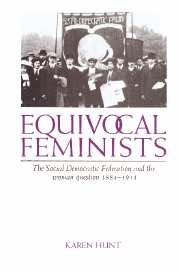Book contents
- Frontmatter
- Contents
- Acknowledgements
- Introduction
- Part 1 The woman question: the theory
- Part 2 The SDF and the woman question: the theory and practice of the party on aspects of the woman question
- 4 The politics of the private sphere
- 5 Women and work
- 6 The suffrage
- Part 3 Women and the SDF: the practical implications of the SDF's understanding of the woman question
- Conclusion
- Appendices
- Bibliography
- Index
5 - Women and work
Published online by Cambridge University Press: 14 January 2010
- Frontmatter
- Contents
- Acknowledgements
- Introduction
- Part 1 The woman question: the theory
- Part 2 The SDF and the woman question: the theory and practice of the party on aspects of the woman question
- 4 The politics of the private sphere
- 5 Women and work
- 6 The suffrage
- Part 3 Women and the SDF: the practical implications of the SDF's understanding of the woman question
- Conclusion
- Appendices
- Bibliography
- Index
Summary
Work is a significant aspect of the woman question. As waged labour it represents an important element of the public sphere while as domestic labour it remains hidden within the private sphere. Labour is also a central concept of the Marxist analysis of society, providing the basis for the definition of classes, of class society and ultimately of human emancipation. Work, therefore, brings together the tension between sex and class which lies at the heart of the socialist construction of the woman question.
For the SDF and its contemporaries, women's work was an area of considerable debate. The most contentious issue was married women's participation in the labour market. Around this clustered concerns about the family wage and the sexual division of labour, as well as a variety of strategies to alleviate the conditions of women's labour, such as protective legislation, unionisation and the endowment of motherhood. Women's work was also one of the arenas in which feminists and socialists often clashed, and where women who were, in effect, feminist socialists found themselves torn. They attempted to voice their concern for the conditions of women's labour within socialist organisations steeped in conventional assumptions about woman's place and her capacities. In examining the way that the SDF tackled the issue of women's work, I want to ask whether the party produced greater homogeneity in its response to this issue, which was firmly embedded in the public sphere, than was possible over the matters deemed to be of private conscience.
- Type
- Chapter
- Information
- Equivocal FeministsThe Social Democratic Federation and the Woman Question 1884–1911, pp. 118 - 151Publisher: Cambridge University PressPrint publication year: 1996

